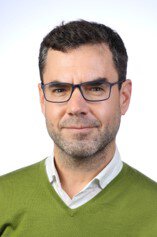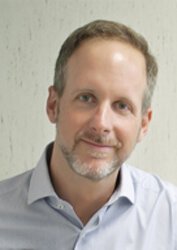At IRYCIS 6 Priority Research Areas are established and a minimum of two coordinators are assigned to each of them, with a basic mission to: i) ensure the achievement of the objectives set for their area overall; ii) guarantee communication and collaboration between the different research groups; iii) guide the emerging groups and the associate clinical researchers to achieve their progressive integration into the consolidated group level.
Cancer
With groups of significant international impact, Area 3 of IRYCIS is positioned as a centre of excellence in cancer research, with a comprehensive approach that ranges from the study of the molecular mechanisms of cancer to the development of innovative therapies and personalised strategies. Its lines of interest include the identification of biomarkers, the characterisation of tumour microenvironments, the study of the genetic and epigenetic bases of cancer, and translational research aimed at improving the diagnosis and treatment of patients. It is one of the areas of IRYCIS with the greatest presence of clinical research, concentrating the largest number of studies and clinical trials. The area's activity is developed in a collaborative environment that encourages the transfer of knowledge and participation in multicentre projects, consolidating it as a benchmark in the fight against cancer at a national and international level.
Leaders
-
Dr.Bruno Sainz Anding
Dr. Bruno Sainz, a virologist by training, earned his PhD in Microbiology and Immunology from Tulane University in New Orleans, LA (USA) in 2005. His early scientific career focused on viral infections, such as Herpes simplex virus type-1, Ebola Virus, and SARS-CoV. Specifically, his research focused on developing inhibitors of viral entry and understanding and exploiting the innate immune Interferon (IFN) response to combat viral infections (funded by a National Institutes of Health (NIH, USA) NRSA research award). As a postdoctoral fellow at the Scripps Research Institute (2005-2006), he developed a more physiologically relevant hepatocyte culture system to study Hepatitis C Virus (HCV) infection in vitro and viral-induced liver cancer. (HCC). Subsequently, while at the University of Illinois in Chicago (2006-2011), he discovered that the Niemann-Pick C1-Like 1 (NPC1L1) cholesterol absorption receptor is an HCV entry factor and the clinically-available and FDA-approved NPC1L1 antagonist ezetimibe (Zetia) can potently block HCV uptake in vitro and in mice with human liver grafts. These findings were patented and published in Nature Medicine in 2012, and Zetia is now being used to prevent liver re-infection in patients undergoing liver transplantation due to HCC.
As a semi-independent investigator at the CNIO in Spain from 2011-2014, Dr. Sainz changed his research focus and began to study cancer stem cell (CSC) biology in pancreatic cancer, with a special focus on immune proteins found in the tumor microenvironment (TME) that can activate the CSC compartment. In 2014, he joined the Universidad Autónoma de Madrid (UAM) and Instituto de Investigaciones Biomédicas Sols-Morreale CSIC-UAM as an independent Ramón y Cajal investigator. His laboratory has made important discoveries in the CSC field. For example, Dr. Sainz and colleagues discovered a new inherent biomarker present in CSCs, known autofluorescence, which is the result of riboflavin accumulation in ABCG2-coated intracellular vesicles exclusively found in CSCs. Using this marker and others discovered since (eg., ANTXR1, CD47), his laboratory has learned that CSCs are distinct from their non-CSCs counterparts at the epigenetic level (e.g. genome methylation and miRNA profiles) and these differences in methylation and miRNA expression are necessary for the maintenance of these cells. In addition, his laboratory has also learned that CSCs are metabolically different than non-CSCs. While non-CSCs meet their energy requirements via glycolysis, CSCs depend on mitochondrial respiration (i.e. oxidative phosphorylation) to survive. Thus, mitochondrial respiration represents an Achille's heel of CSCs, and his group is exploiting new experimental compounds and targeting specific genes [e.g. Interferon-Stimulated Gene 15 protein (ISG15)] in order to alter CSC metabolic requirements. Lastly, Dr. Sainz has shown that TME proteins, such as the human cationic antimicrobial protein 18 (hCAP-18)/LL-37 peptide, ISG15 and YWHAZ are important for CSC "stemness", EMT, chemoresistance and metabolic plasticity.
Dr. Sainz is currently a Research Scientist at the Instituto de Investigaciones Biomédicas Sols-Morreale, a joint CSIC-UAM center and member of the IRYCIS Research Commission. The achievements and research of Dr. Sainz's Laboratory have resulted in more than 100 publications, several grants awarded in the United States (Cancer Research Institute, Concern Foundation), Spain (ISCIII, AECC, ACANPAN, Beca FERO) and Europe (EURO-NanoMed, TRANSCAN3), 4 patent applications, numerous talks and invitations to presentations, editorial affiliations and international recognition. Dr. Sainz has extensive experience in immunology, virology and oncology, with specific expertise in pancreatic cancer, small animal cancer models and drug discovery.
Contact: bsainz(ELIMINAR)@iib.uam.es
Close -

Dr. José Valentín García Gutiérrez
I have a degree in Medicine from the University of Granada (2003), and I am a specialist in Hematology and Hemotherapy at the Ramón y Cajal University Hospital (HURYC), where I also obtained my PhD. I also have a Master's degree in Management and Innovation in the Health Sector from the Instituto de Empresa. I am currently a specialist doctor in the Hematology Service at HURYC and an Associate Professor of Medicine at the University of Alcalá. In addition, I hold other roles such as President of the Spanish Chronic Myeloid Leukemia Group (GELMC), President of the Madrid Group of Myeloproliferative Neoplasms, Vice President of the Spanish Society of Hematology and Hemotherapy (SEHH) and member of the Board of Directors of the Spanish Group of Philadelphia Negative Myeloproliferative Neoplasms (GEMFIN).
My research focuses on three lines: (1) Prognostic characterization and response to treatment in hematological malignancies, (2) Development and evaluation of new therapies in myeloproliferative malignancies, and (3) Immune characterization of oncohematological patients and immune response to infections. Throughout my research career, I have participated as Principal Investigator in various projects with public and private competitive funding, highlighting two consecutive ISCIII research projects (PI21 and PI24), as well as in more than 45 clinical trials (phases II-IV) on myeloproliferative malignancies and bone marrow transplantation. I have also coordinated six national clinical trials on chronic myeloid leukemia and have been a member of steering committees for international clinical trials. Regarding my teaching experience, I have directed four doctoral theses, participated as a guest professor in master's degrees at various universities, and as a regular speaker at national and international hematology conferences.
My scientific production includes more than 150 international publications, with an h-index of 29 and 3,500 citations in Scopus, being the main author of more than 30 specific publications on myeloproliferative neoplasms and having contributed to eight national guidelines and ten book chapters.
In the field of international collaborations, I participate in prestigious groups such as Gimema, iCML Foundation and European LeukemiaNet, being a member of their panel of experts. I maintain an academic collaboration with the University of La Sapienza in Rome and have previous experience in institutions such as MD Anderson Cancer Center, National Institute of Medical Sciences and Nutrition Salvador Zubirán and Memorial Sloan Kettering Cancer Center.
Contact: jvalentingg@gmail.com
Close
Groups
-
Molecular Pathology of Cancer Group
Group leader:
José Palacios Calvo -
Biomarkers and Personalized Approach to Cancer Group (BioPAC)
Group leader:
Bruno Sainz Anding -
INTERNAL MORPHOGENESIS AND HOMEOSTASIS
Group leader:
Fernando Martín Belmonte -
Translational Haematology
Group leader:
Francisco Javier López Jiménez -
Translational lung cancer research group
Group leader:
Pilar Garrido López -
Translational cancer research
Group leader:
Gema Moreno Bueno

